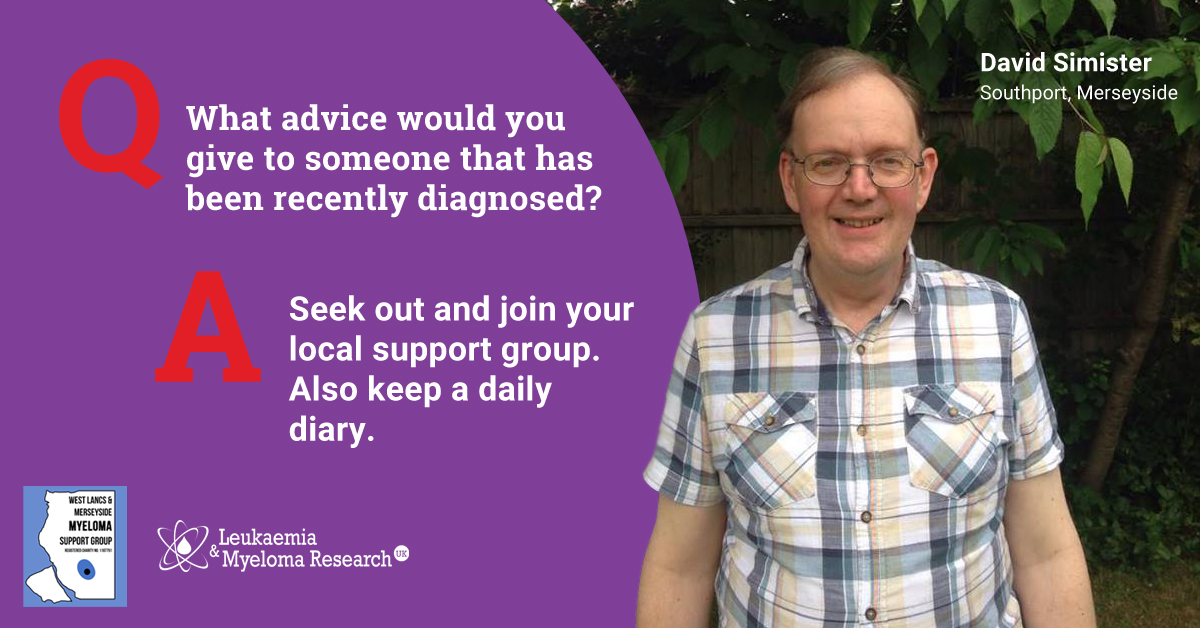
Five Myeloma patients have shared their symptoms and diagnosis to help others affected by blood cancer to mark Myeloma Awareness Month this March.
In an initiative led by Leukaemia and Myeloma Research UK (LMRUK), we’ve partnered with members of the West Lancs & Merseyside Myeloma Support Group to share their stories.
The campaign highlights real-life experiences of people affected by this form of blood cancer, as well as the different treatments to manage the condition and ways to protect your mental health after a diagnosis.
Myeloma is a blood cancer deriving from plasma cells, a type of white blood cell made in the bone marrow. Normal plasma cells produce the antibodies that help us to fight infection. However, if damaged during development, the plasma cells can multiple uncontrollably in the bone marrow, which interferes with the production of red blood cells, causing anaemia and bone damage.
We’re helping to raise awareness of the disease, also called multiple myeloma as it often affects several areas of the body, including the spine, pelvis and ribs. Symptoms include bone pain, often in the middle or lower back, ribs and hips. Patients can also feel overwhelming tiredness and have recurring infections.
Geraldine Connolly, from Hoylake, Wirral, suffered from severe lower back pain and discomfort in her joints, legs and feet before she was diagnosed with Myeloma. After her diagnosis, she said her membership in the West Lancs and Merseyside Myeloma Support Group has been a big comfort.
“Meeting so many people with the same condition and concerns and being able to talk with people who understand how you are feeling is so important,” she said. “They give you encouragement but most of all, you know you are not on your own.”
She advised anyone being diagnosed with Myeloma to find out as much information as possible and not be afraid to ask questions. “Don’t panic,” she said. “There are so many treatments out there now and more research is being done in this field. Stay positive!”
Others affected by the illness, who are also part of the West Lancs and Merseyside Myeloma Support Group, have highlighted the value of talking with others about the condition – and keeping a positive mindset.
Dave Loveday of Ormskirk, Lancashire, was diagnosed 23 years ago after an accident at work prompted X-rays and a CT scan, which revealed lesions on his bones. Roger Ellis of Chester also had no symptoms, but a routine blood test revealed high levels of paraprotein, a marker for Myeloma. Roger said: “I was fortunate the GP included this as part of the investigation into a fainting episode.”
Catherine Mangnall of Orrell, Wigan, was first diagnosed with another condition, Pulmonary Hypertension and after a series of blood tests was also found to have Myeloma, on her 66th birthday in November 2020. She said: “It is difficult to deal with two life-threatening, treatable, but not curable illnesses,” but she added help and support were available and encouraged everyone affected by Myeloma to seek it out.
David Simister of Southport, Merseyside, had classic symptoms of Myeloma – fatigue and back pain. He too said help was available and he warned: “Avoid Google – speak to others similarly affected and seek out and join a local support group.”
We provide significant support for research into blood cancers, including Myeloma, providing grants for medical researchers in the field.
Our Operations Director, Dr Joanna Tilley, said: “When a person is diagnosed with Myeloma, they will need urgent treatment to protect the bones and kidneys from further damage. The treatment varies depending on the age and fitness of the patient.
“Treatments include targeted therapies and immunotherapy drugs, chemotherapy, steroids and stem cell transplants. These forms of treatment can be very effective at controlling the disease and relieving its symptoms; however, every case is different.
“To date, there is no cure for Myeloma but the outlook is significantly better than it was 15 years ago, with patients living in excess of 10 years from diagnosis.
“We’re really pleased to have partnered with the West Lancs & Merseyside Myeloma Support Group to raise awareness of one of the most common forms of blood cancer and we’re very grateful to their members for sharing their personal experiences with Myeloma to help others going through a similar experience.”
To find out more about Myeloma, click here https://lmruk.org/2021/10/18/what-is-myeloma/. To learn more about the West Lancs and Merseyside Myeloma Support Group, visit their website: https://wlm-myeloma.uk/.









